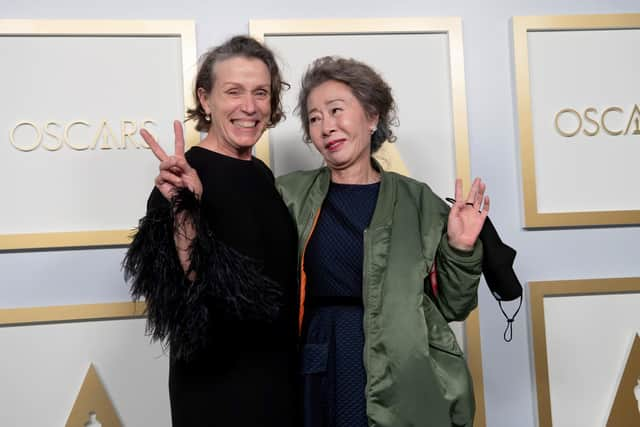Analysis: Why Oscars was a rebuke of Netflix and a plea for cinema's comeback after Covid
So said Nomadland producer and star Frances McDormand when accepting the Academy Award for best film on Sunday evening, in what was one of the strangest Oscar ceremonies in memory.
When she picked up a second Oscar moments later for best actress for her astonishing performance in the the same film, she quoted Macbeth and made a point about loving work and thanking the Academy for understanding.


Advertisement
Hide AdBoth speeches were typically succinct, but they felt like a plea to get back to the business of making and releasing movies specifically for the big screen at a time when the industry’s future is far from certain.
Nomadland’s deserved victory is certainly a testament to the power of brilliant cinema and made history in its own right when the Chinese-born, British-raised, American-based Chloé Zhao became the first woman of colour to win the Oscar for best director — and only the second woman ever to win the award.
Revolving around an itinerant widower (McDormand) traversing the US in a van, the movie itself is a subtle indictment of the failures of America in the era of the gig economy, yet it also showcases Americans at their most compassionate — a fact Zhao, who cast many of the real-life nomads as themselves in the film — acknowledged in her speech.
But McDormand’s win for best actress — her third — also put her in the triple Oscar club alongside Meryl Streep, Daniel Day-Lewis and Jack Nicholson.
Joining her was Anthony Hopkins, who won his third Oscar for playing an Alzheimer’s sufferer in The Father.
His victory should have been a highlight on a night that saw popular wins for young British actor Daniel Kaluuya as slain Black Panther leader Fred Hampton in the excellent Judas and the Black Messiah and veteran Korean actress Yuh-Jung Youn in the wonderful family drama Minari.
Advertisement
Hide AdBut Hopkins was a no-show and because his category was, bizarrely, the final award of the night – usually the award for best film closes the ceremony – it proved anti-climactic, something perhaps not helped by the fact the late Chadwick Boseman had been widely tipped to win the award for Ma Rainey’s Black Bottom.
That break with the ceremony’s traditional format was the weirdest decision in a show that reflected the weirdness of the times, though it was certainly a sly move to have Contagion director Steven Soderbergh produce what was essentially the pandemic Oscars.
Advertisement
Hide AdEschewing the casual Zoom format that’s become a staple of awards shows, the ceremony took place mostly in LA’s Union Station and kicked off with a dynamic action shot that wouldn’t have looked out of place in Soderbergh’s Ocean’s Eleven.
Soderbergh said ahead of the ceremony he wanted it to have the feel of a movie and shot it accordingly, with movie stars delivering scripted interludes and widescreen cinematography — a symbolic choice for a televised celebration of cinema given we’ve had little option, but to watch movies at home this past year.
And yet, with Netflix’s big contenders Mank, Ma Rainey’s Black Bottom and The Trial of the Chicago 7 once again shut out of the major awards despite their many nominations, it’s hard not to view the results as a rebuke of streaming’s new-found dominance.
Comments
Want to join the conversation? Please or to comment on this article.
